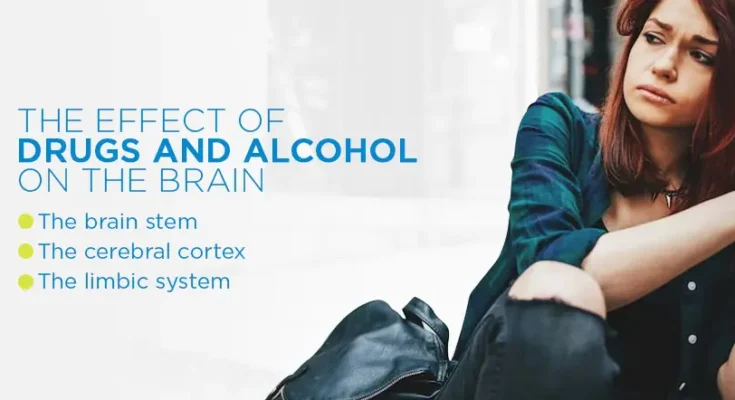Drug addiction, also known as substance use disorder, has profound effects on both the brain and the body. These effects are often long-lasting and can lead to significant physical, psychological, and behavioral changes. Below is a detailed explanation of how drug addiction impacts the brain and body:
Effects of Drug Addiction on the Brain
The brain is the primary target of drug addiction, as drugs alter its structure and function, particularly in areas related to reward, motivation, memory, and decision-making.
1. Changes in Brain Chemistry
- Dopamine System:
- Drugs hijack the brain’s reward system by flooding it with dopamine, a neurotransmitter associated with pleasure and motivation.
- Over time, the brain produces less dopamine naturally, making it harder to feel pleasure without the drug.
- Tolerance:
- Repeated drug use leads to tolerance, where higher doses are needed to achieve the same effect.
- Dependence:
- The brain becomes reliant on the drug to function normally, leading to withdrawal symptoms when the drug is not used.
2. Structural Changes
- Gray Matter Reduction:
- Chronic drug use can reduce gray matter in areas responsible for decision-making, self-control, and memory (e.g., prefrontal cortex).
- White Matter Damage:
- Drugs can impair white matter, which affects communication between different brain regions.
3. Impaired Cognitive Functions
- Memory and Learning:
- Drugs like alcohol, marijuana, and opioids can impair short-term and long-term memory.
- Decision-Making and Judgment:
- The prefrontal cortex, responsible for rational thinking, is often compromised, leading to poor decision-making and impulsivity.
- Attention and Focus:
- Stimulants like cocaine and methamphetamine can initially improve focus but eventually lead to attention deficits.
4. Mental Health Disorders
- Anxiety and Depression:
- Drug use can exacerbate or trigger mental health conditions.
- Psychosis:
- Drugs like methamphetamine and hallucinogens can cause hallucinations, paranoia, and delusions.
5. Craving and Compulsive Behavior
- The brain’s reward system becomes rewired, leading to intense cravings and compulsive drug-seeking behavior, even in the face of negative consequences.
Effects of Drug Addiction on the Body
Drug addiction takes a severe toll on the body, affecting nearly every organ system. The specific effects depend on the type of drug, the duration of use, and the individual’s overall health.
1. Cardiovascular System
- Heart Damage:
- Stimulants like cocaine and methamphetamine can cause irregular heartbeats, heart attacks, and cardiomyopathy.
- High Blood Pressure:
- Many drugs increase blood pressure, leading to a higher risk of strokes and heart disease.
2. Respiratory System
- Lung Damage:
- Smoking drugs like tobacco, marijuana, or crack cocaine can cause chronic bronchitis, emphysema, and lung cancer.
- Respiratory Depression:
- Opioids can slow breathing, leading to hypoxia (oxygen deprivation) or fatal overdose.
3. Liver and Kidneys
- Liver Damage:
- Alcohol, opioids, and other drugs can cause hepatitis, cirrhosis, or liver failure.
- Kidney Damage:
- Chronic drug use can lead to kidney failure or damage, especially with drugs like heroin or synthetic cannabinoids.
4. Immune System
- Weakened Immunity:
- Drug use can suppress the immune system, making the body more susceptible to infections and illnesses.
5. Gastrointestinal System
- Digestive Issues:
- Opioids can cause constipation, while stimulants may lead to nausea, vomiting, or abdominal pain.
- Malnutrition:
- Drug addiction often leads to poor eating habits, resulting in nutrient deficiencies.
6. Musculoskeletal System
- Muscle Weakness:
- Chronic drug use can lead to muscle atrophy and weakness.
- Bone Damage:
- Drugs like steroids can weaken bones, increasing the risk of fractures.
7. Reproductive System
- Hormonal Imbalances:
- Drug use can disrupt hormone production, leading to infertility or sexual dysfunction.
- Pregnancy Complications:
- Pregnant women who use drugs risk miscarriage, stillbirth, or neonatal abstinence syndrome (NAS) in their babies.
8. Infectious Diseases
- Needle Sharing:
- Injecting drugs with shared needles increases the risk of HIV, hepatitis B, and hepatitis C.
- Skin Infections:
- Injecting drugs can cause abscesses, cellulitis, and other skin infections.
Long-Term Effects of Drug Addiction
- Chronic Health Conditions:
- Long-term drug use can lead to permanent damage to the brain, heart, liver, and other organs.
- Cognitive Decline:
- Persistent memory loss, reduced IQ, and impaired learning abilities.
- Mental Health Disorders:
- Increased risk of chronic anxiety, depression, and psychosis.
- Social and Economic Consequences:
- Loss of relationships, employment, and financial stability.
Recovery and Healing
While the effects of drug addiction on the brain and body can be severe, the brain has a remarkable ability to heal with time and proper treatment. Recovery often involves:
- Detoxification:
- Medically supervised withdrawal to manage symptoms safely.
- Behavioral Therapy:
- Cognitive-behavioral therapy (CBT) and other therapies to address underlying causes and develop coping skills.
- Medication-Assisted Treatment (MAT):
- Medications like methadone, buprenorphine, or naltrexone to reduce cravings and withdrawal symptoms.
- Lifestyle Changes:
- Healthy eating, exercise, and stress management to support physical and mental recovery.
Conclusion
Drug addiction has devastating effects on the brain and body, but recovery is possible with the right support and treatment. If you or someone you know is struggling with addiction, seeking professional help is the first step toward healing and rebuilding a healthy life.



